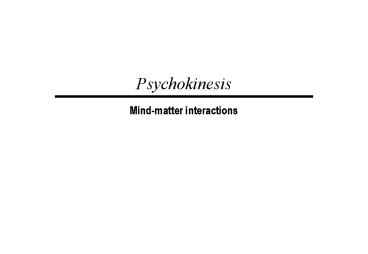Psychokinesis - PowerPoint PPT Presentation
1 / 13
Title:
Psychokinesis
Description:
direct mental influence on state or motion of a physical object or ... thoughtography' produced approx. 1000 images. sitter-group phenomena. table-tilting ... – PowerPoint PPT presentation
Number of Views:531
Avg rating:3.0/5.0
Title: Psychokinesis
1
Psychokinesis
- Mind-matter interactions
2
Psychokinesis (PK)mind-movement
- broadly defined...
- direct mental influence on state or motion of a
physical object or system - macro-PK
- strong effects observable by naked eye
- e.g., levitation, metal-bending
- micro-PK
- weak effects needing statistical analysis
- e.g., influencing roll of dice
3
Macro-PK
- extremely rare
- generally limited to gifted subjects and
poltergeist cases - big problem of fraud
- experimental methods can be used if phenomena are
voluntary and repeatable - variety of macro-PK abilities
- testing relies upon subject's abilities
4
Macro-PKcase studies
- Nina Kulagina (1960s)
- Soviet (died 1990)
- movement of small objects
- Felicia Parise (1970s)
- American
- early 1970s
- worked at Maimonides Medical Centre
- saw film of Kulagina and tried to copy...
5
Macro-PKcase studies
- Uri Geller
- Israeli
- began around 1965
- many anecdotal accounts - few well-controlled
experiments - best known for metal bending
- difficult to control against normal bending and
substitution - studies of mini-Gellers
- so-called Geller effect
6
Macro-PKcase studies
- Ted Serios
- thoughtography
- produced approx. 1000 images
- sitter-group phenomena
- table-tilting
- Philip group (Toronto)
7
Micro-PKtargets and testing procedures
- dice test
- developed by Rhine
- task was to make dice land with predetermined
face uppermost - used electromechanical device to release dice
- placement test
- other mechanical targets
- e.g., Cascade (PEAR lab)
8
Micro-PKtargets and testing procedures
- random event generators (REG)
- originated with Schmidt machines
- based on true random source (e.g., radioactive
decay) - can link to computers with graphic displays
- (Note computer randomisation procedures are
pseudo-random) - biological systems
- referred to as Bio-PK or Direct Mental
Interactions between Living Systems) - e.g., influencing another persons physiology
from a distance - relevance to healing
9
Variations in testing procedures
- covert tasks
- subjects not told key feature of experiment
- (e.g., which dice face to be uppermost)
- incorporate REGs into computer games
- time-displaced PK
- future PK
- subject attempts to influence target sequence in
advance of its production - retro-PK
- target sequence generated (but not observed)
- later... sequence displayed to subject who
attempts to influence sequence
10
Micro-PKSome findings
- Radin Ferrari meta-analysis (1991)
- PK effects with dice
- Reviewed 148 experiments published 1935-1987
- Converted hit-rates to compare with 50 MCE
- Control trials 50.02
- Experimental trials 51.2 (highly significant!)
- Radin Nelson meta-analysis (1989)
- RNG PK effects
- 832 studies published 1959-1987
- Results comparable to dice effects
11
Micro-PKRecent updates
- Bösch, Steinkamp, Boller meta-analysis (2006)
- 380 studies reviewed
- Small but significant overall effect
- Concluded it could be explained by publication
bias - Radin et al. (2006) question interpretation of
findings - Wilson Shadish (2006) question importance of
such a small effect
12
PK some conceptual issues
- are macro-PK and micro-PK the same thing?
- can both be explained in the same way?
- are ESP and PK distinct phenomena?
- Data Augmentation Theory (May, et al.)
- general preference for the term psi
13
Useful references
Radin, D. I. Ferrari, D. C. (1991). Effects of
consciousness on the fall of dice A
meta-analysis. Journal of Scientific Exploration,
5, 61-84. Radin, D. I. Nelson, R. D. (1989).
Evidence for consciousness-related
anomalies in random physical systems. Foundations
of Physics, 19, 1499-1514. Bösch, H., Steinkamp,
F., Boller, E. (2006). Examining psychokinesis
The interaction of human intention with
random number generators - A meta- analysis.
Psychological Bulletin, 132, 497-523. Radin, D,
Nelson, R., Dobyns, Y., Houtkooper, J. (2006).
Reexamining psychokinesis Comment on Bösch,
Steinkamp, and Boller (2006). Psychological
Bulletin. 132, 529-532. Wilson, D. B. Shadish,
W. R. (2006). On blowing trumpets to the tulips
To prove or not to prove the null
hypothesis--Comment on Bösch, Steinkamp, and
Boller (2006). Psychological Bulletin, 132,
524-528.































